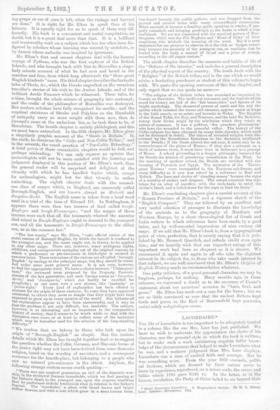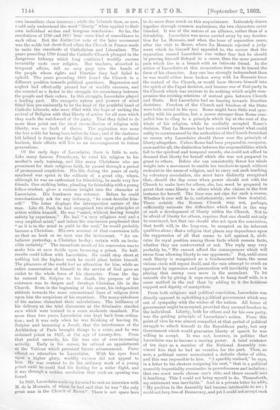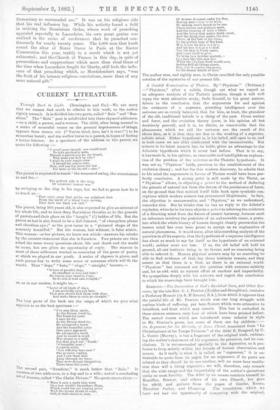LAC 0 RDAIRE.* THE life of Lacordaire is too important
to be adequately treated in a volume like the one Mrs. Lear has just published. We have no wish to underrate the appreciation she shows of his character, nor the graceful style in which the book is written; but to make such a work satisfactory requires fuller know- ledge of the circumstances that helped to make Lacordaire what he was, and a matures judgment than Mrs. Lear displays. Lacordaire was a man of exalted faith and courage. But he was something more. From the year 1830 onwards, politi- cal factions, which are doomed by their nature never to learn by experience, reproduced, on a minor scale, the errors and follies which 1793 gave birth to. In the latter, as in the former, revolution, the Party of Order failed to see beyond their - —
* Henri Dominique Lacordaire. A Biographical Sketch, By II. L. Sidney Lear. London: Rivingtons. 1882. own immediate class interests ; while the Liberals then, as now, could only understand the word "liberty" when applied to their own individual wishes and foregone conclusions. So far, the revolutions of 1789 and 1843 bear some kind of resemblance to each other. But the distinctive note of the later movement was the noble but short-lived effort the Church in France made to unite the standards of Catholicism and Liberalism. The years preceding 1789 found the Catholic Church plunged in the dangerous lethargy which long continual worldly success invariably casts over religien. Her teachers, absorbed in temporal affairs, fell an easy prey into the hands of the people whose rights and liberties they had failed to uphold. The years preceding 1848 found the Church in a different position towards political questions. Repression and neglect had effectually pruned her of worldly excesses, and she counted as a factor in the struggle for ascendancy between the people and their rulers. In this struggle, Lacordaire played a leading part. His energetic nature and powers of mind fitted him pre-eminently to be the head of the youthful band of Catholic Liberals, who were filled with the hope of uniting the revival of Religion with that liberty of action for all men which they made the watchword of the party. That they failed to do more than point out the ideal reconciliation of religion with liberty, was no fault of theirs. The aspiration was none the less noble for being born before its time; and if the darkness left behind is deeper for the light they cast upon the political horizon, their efforts will live as an encouragement to future generations.
Of the early days of Lacordaire, there is little to note. Like many famous Frenchmen, he owed his, religion to his mother's early training, and like many Christians who are prominent for their religions faith, he passed through a period of pronounced scepticism. His life during the years of early manhood was spent in the solitude of a great city, where, although he was an enthusiast for friendship, he made very few friends. One striking letter, pleading for friendship with a.young fellow.:student, gives a curious insight into the character of Lacordaire. His frankness was extreme. Before he could conscientiously ask for any intimacy, "he must describe him- self." The letter displays the introspective nature of the man. Like St. Paul, he had recognised two rival principles of action within himself. He was "sated, without having bought satiety by experience." He had " a very religious soul and a very sceptical mind," and before his conversion prophesied that as it is in the mind to yield to the soul," he would probably become a Christian. His own account of that conversion tells us that no book or no man was the instrument. "An un- believer yesterday, a Christian to-day ; certain with an invin- cible certainty." The immediate result of his conversion was to make him at once decide upon becoming a priest. No half- results could follow with Lacordaire. He could stop short at nothing but the highest work he could place before himself. The pleasures of the world had no attraction for him, while an entire consecration of himself to the service of God gave an outlet to the whole force of his character. From the day he entered St. Sulpice to his death, the purpose of his existence was to deepen and develops Christian life in the Church. Even in the beginning of his career, his independent attitude towards the more conventional lines of religion drew upon him the suspicions of his superiors. The many-sidedness of his nature disturbed their calculations. The brilliancy of his delivery at the trial discourses at the Seminaire startled ears which were trained to a more moderate standard. For more than two years, Lacordaire was kept back from ordina- tion; and it was only when he was thinking of leaving St. Sulpice and becoming a Jesuit, that the interference of the Archbishop of Paris brought things to a crisis, and he was ordained priest in 1827, at the age of twenty-five. From that period onwards, his life was one of ever-increasing activity. Early in his career, he refused an appointment at the Vatican which promised future advancement. Fame offered no attraction to Lacordaire. With his eyes fixed upon a higher glory, worldly encase did not appeal to him. He was content to do the ordinary work of a young priest until he could find his footing for a wider flight, and it was through a sudden resolution that such an opening was found.
In 1820, Lacordaire made up his mind to seek an interview with M. de la Mennais, of whom he had said that he was "the only great man in the Church of Rome." . There is not space here to do more than touch on this acquaintance. Intimately drawn together through common aspirations, the two characters never blended. It was of the nature of an alliance, rather than of a friendship. Lacordaire was never carried away by any fascina- tion for La Mennais, and when the hour of separation came, after the visit to Rome, where La Mennais rejected a judg- ment which he himself had appealed to, the sorrow that the separation caused Lacordaire was rather fear lest he should be proving himself disloyal to a cause, than the more personal pain which lies in a breach with an intimate friend. In the action of Lacordaire at this momentous time can be traced the force of his character. Any one less strongly independent than he was would either have broken away with La Mennais from the control of the Church, or would have thrown himself into the spirit of the Papal decision, and become one of that party in the Church which was anxious to do nothing which might com- promise the existing relations of mutual gain between Church and State, But Laeordaire had no leaning towards Erastian doctrines. Freedom of the Church and freedom of the State were both sacred in his eyes. Rome might have little real sym- pathy with his position, but a power stronger than Rothe com- pelled him to cling to a principle which lay at the root of the whole of his religion, while he cordially accepted Rome's decision. That La Mennais had been carried beyond what could safely be countenanced by the authorities of the Church furnished no reason why Lacordaire should throw over the principle of liberty altogether. Unless Rome had been prepared to recognise, once and for all, the distinction between the responsibilities which fall to the spiritual and temporal swords, she could not afford to demand that liberty for herself which she was not prepared to grant to others. Before she can consistently throw her whole weight into a movement to enable her teachers to speak without restraint in the name of religion, and to carry out such teaching. by voluntary association, she must have distinctly recognised that, should the day come when power should rest with the Church to make laws for others, she, too, must be prepared to grant that same liberty to others which she claims in the first instance for herself. The time was not ripe for such a course. Whether it aver will be is, unfortunately, more than doubtful. Those outside the Roman Church may. not, perhaps,. sufficiently estimate the difficulties which stand in the way of such a development of. liberty within the Church. Not to be afraid of liberty for others, requires that one should not only be convinced, but that one should also act upon the conviction,. that truth will, in the long-run, be accepted on its inherent qualities alone; that a religion that places any dependence upon the suppression of all that seems to tell against it, abdi- cates its royal position among those facts which remain facts, whether they are controverted or not. The reply may very probably be, " We cannot afford the consequences which will ensue from allowing liberty to our opponents." But, until some such liberty is recognised as a fundamental basis, the same vicious circle will repeat itself, and the vain attempt to crush an opponent by repression and persecution will inevitably result in placing that enemy once more in the ascendant. To let untruth die by giving it rope enough to hang itself with, is a surer method in the end than by adding to it the fictitious support and dignity of martyrdom.
From both religious and political conviction, Lacordaire was directly opposed to upholding a political government which was out of sympathy with the wishes of the nation. All forms of government might be accepted, provided they secured freedom to the individual. Liberty, both for others and for his own party, was the guiding principle of Lacorchtire's action. From this point of view he was almost compelled at that period of political struggle to attach himself to the Republican party, but any Government which would guarantee liberty of speech he was
willing to accept. It was not, however, in politics that Lacordaire was to become a moving power. A brief existence of ten days as a member of the National Assembly con- vinced him that he had no vocation for the part. Then, as now, a political career necessitated a definite choice of sides, and this was impossible` to him. " I speedily realised," he says, in a letter to his electors resigning his seat, " that in a political assembly impartiality eventuates in powerlessness and isolation ; that one must needs choose one's side, and throw oneself into it headlong. This I could not bring myself to do. Thenceforth, my retirement was inevitable." And in a private letter he adds, " My position in the Assembly had become intolerable to me ; 1 could not keep free of Democracy, and yet I could not accept such
Democracy as surrounded me." It was on his religious side that his real influence lay. While his activity found a field in reviving the Dominican Order, whose work of preaching appealed especially to Lacordaire, his own great genius was realised in the series of conferences that ho preached con- tinuously for nearly twenty years. The 4,000 men that knelt round the altar of Notre Dame in Paris at the Easter Communion this year, testify to a result which is not yet exhausted; and the Church of France in this day, in spite of persecutions and suppressions which more than rival those of the time when Lacordaire fought for liberty, still feels the influ- ence of that preaching which, as Montalembert says, "was the fruit of his intense religious convictions, more than of any mere natural gift."
































 Previous page
Previous page